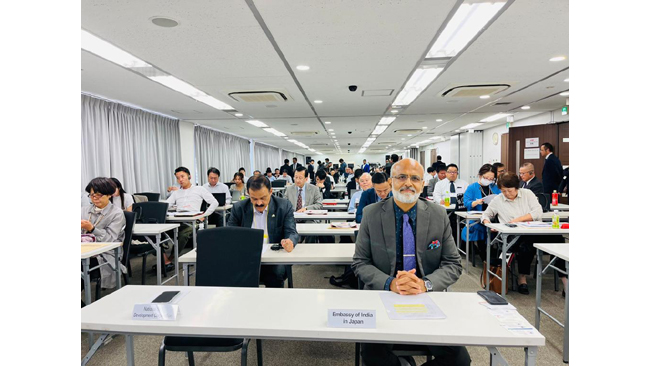
New Delhi, November 2023.
In line
with the visionary objective set forth by the Hon’ble Prime Minister, Shri
Narendra Modi, to position India as the Global Skill Hub, the National Skill
Development Corporation (NSDC) recently organized two impactful Business
Matchmaking Seminars in the vibrant cities of Osaka and Tokyo. These seminars served as a pivotal platform to enlighten stakeholders and
industry leaders about the immense potential of Indian candidates in the global
job market.
Co-organized
in collaboration with the Japan International Trainee & Skilled Worker
Cooperation Organization (JITCO) and the Embassy of India, these seminars had a
primary objective: to enhance the visibility of Indian Sending Organizations
(SO) and to underscore the compelling value proposition that India presents in
addressing Japan's skilled labor shortage.
The
seminars received valuable support from key governmental bodies, including the Ministry
of Skill Development & Entrepreneurship (MSDE), the Ministry of External
Affairs (MEA), and the Embassy of Japan in India. These seminars were
specifically centred around two noteworthy government-to-government
initiatives: the Technical Intern Training Program (TITP), initiated in
October 2017, and the Specified Skilled Worker (SSW) program, which was
established in January 2021. At the event, attendees representing diverse
organizations engaged in productive discussions aimed at closing the prevailing
skills gap. This involved creating an effective platform for Indian Stakeholder
Organizations (SOs) to collaborate with Japanese Supervising Organizations
(SVO) and Implementing Organizations (IOs).
With over
45 participants and 40 companies in Osaka each from Japanese and Indian
organizations. The dignitaries who were present at the event are Mr. Anil
Kumar Raturi, Consul Head of Chancery, Consulate General of India, Osaka Kobe,
Mr. Masato Kume, Deputy General Manager International Affairs Dept, JITCO, Mr.
Masato Kume, Deputy General Manager International Affairs Dept, JITCO and Mr.
Nitin Kapoor, General Manager, CEO Office & Strategy and Mr. Anshul
Singhal, Deputy General Manager, NSDC. We were also joined virtually by Mr. Bhupendra
Singh, Deputy Secretary, OIA Division, Ministry of External Affairs and Ms.
Shruti Pandey, Deputy Director, International Collaboration, Ministry of Skill
Development and Entrepreneurship, Government of India.
In Tokyo, the event saw an impressive participation with 50+ participantsfrom 40 companies and17 Indian Sending Organizations. The event also had key guests from the Embassy of India, NIFCO, and ZENKEN, alongside the dedicated NSDC India team. Among the dignitaries, the ones who graced us with their presence areMr. Sanjeev Manchanda, First Secretary, Embassy of India Presentation on human resources in India,Mr. Bhupendra Singh, Deputy Secretary, OIA Division, Ministry of External Affairs (Virtual), Mr. Shimpei Sugiura,
Executive
Vice President, JITCO, Mr. Nitin Kapoor, General Manager, CEO Office &
Strategy, Mr. Isamu Koyama, Advisor, NSDC and Mr. Anshul Singhal, Deputy
General Manager, NSDC.Japanese corporates and recruitment agencies like NIFCO Inc, Fourth
Valley, Zenken Corporation etc. also attended the seminars.
Lauding
the initiative,Shri Ved Mani Tiwari, CEO, NSDC and MD, NSDC International
said, "We firmly believe that India has the potential to
significantly contribute to the requirements of skilled workforce, globally.”
“Our
candidates are equipped to meet the demands of various industries in Japan, and
through collaborative efforts, we can ensure a seamless exchange of talent.
This partnership between India and Japan holds immense promise for mutual
growth and development, and we are committed to fostering a strong, fruitful
relationship in the global job market."During the seminars, some beneficiaries
of the TITP programs shared their experiences to help experts understand the
labour market supply and demand, lessons learned and best practices. This also
facilitated better dialogue between public and private stakeholders.
India and
Japan have collaborated on various skill development initiatives, such as the
India-Japan Skill Development Council, which promotes cooperation in vocational
education, training, and human resource development. In 2016, the nations
signed the "Manufacturing Skill Transfer Promotion Programme” agreement
for training 30,000 persons over 10 years with Japanese style manufacturing
skills and practices. Thirty-five Japan-India Institutes for Manufacturing
(JIM) and 11 Japanese Endowed Courses (JEC) have been established in different
states across India.
In 2017,
The TITP MoC was signed to significantly expand
the bilateral cooperation between India and Japan in the skill development
sector. Under the program, selected candidates from India undergo three-to-five
years of internship in Japan, after which they are required to return to India
and utilize the skills acquired by them in Japan.
Similarly, ‘Specified Skilled Worker’ was introduced by
the Government of Japan in April 2019, under which aspiring Indian youth can
take up a job and stay in Japan. Japan introduced ‘Specified Skilled Worker’ to
address the severe labour shortages in Japan by accepting foreign human
resources with specific expertise and skills. As of July 2022, Japan has signed
SSW Memorandum of Cooperation (MoC) with 15 nations including India. India and
Japan signed a Memorandum of Cooperation in January 2021 for the implementation
of ‘Specified Skilled Worker’ between India and Japan.
NSDC International, 100% subsidiary of NSDC, is catering to a comprehensive list of sectors facilitating skill development and training initiatives aimed at fostering employment opportunities and driving economic expansion. They include textile, healthcare, construction, hospitality, and railways. India and Japan's joint initiatives in skill development extend far beyond their national boundaries. They both embrace a shared vision
of
fostering international mobility as a central pillar of their partnership. This
collective vision is rooted in the firm belief that a globally competent
workforce is paramount in tackling the challenges and capitalizing on the
opportunities of the 21st century.